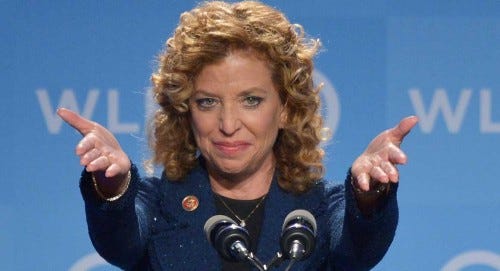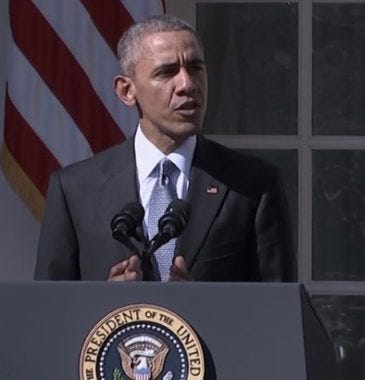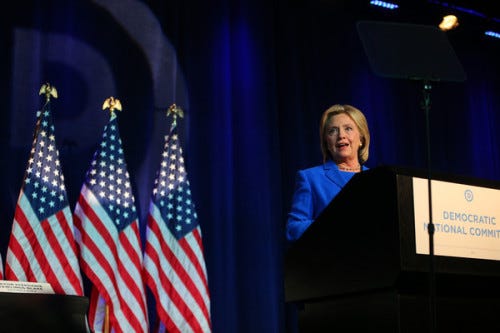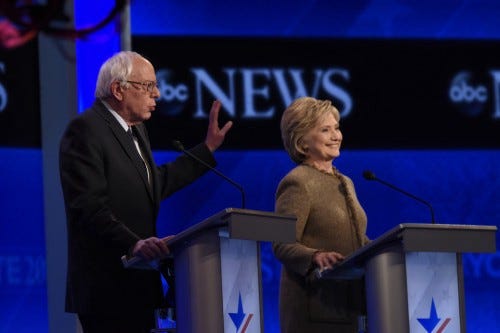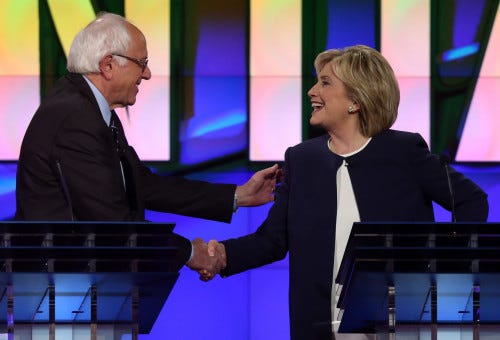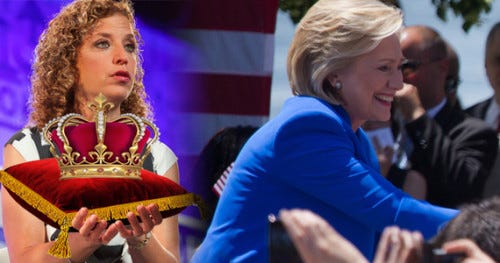A pattern of miscalculation and mishandling in the DNC
Debbie Wasserman-Schultz, the chairwoman of the Democratic National Committee (DNC), has been under fire for the past year for her mishandling of the Democratic primary process. Critics point to her directives on debates and her past as a Clinton partisan as reasons she is unfit to shepherd the party through the 2016 election.
But Wasserman-Schultz’s problems with the party go back further than her almost five-year term as DNC chair.
In fact, over the past ten years, Wasserman-Schultz has made a series of blunders. Even in the face of this pattern of poor decisions and judgment, she has still risen through the ranks of the Democratic Party and now holds arguably the coalition’s most powerful position outside of the presidency.
[D]ebbie Wasserman-Schultz is a perfect example of the career politician. Her entire post-college career has been spent in the public sector. Wasserman-Schultz’s rise through her party’s ranks- from Florida State Representative Peter Deutsch aide in 1988 to DNC chair in 2011- has followed an ambitious script that few politicians can hope to read.
Wasserman-Schultz’s career in Florida state politics began early. She was hired on by Deutsch right out of college and spent the next four years splitting time between working in the state representative’s office and getting her Master’s in 1990. By 1992, Deutsch was looking forward to retirement and picked Wasserman-Schulz as his successor. She won his seat.
Term limits in Florida kept Wasserman-Schultz from running for another term in 2000, so instead she set her sights on the State Senate. Another election, another win- but this time the Floridian looked nationally for her next move. After four years in the State Senate, Wasserman-Schultz moved north to D.C.
[U].S. Representative Debbie Wasserman-Schultz was sworn into office in 2005. She lost no time inserting herself into the Democratic Party machinery in the House. As a first term member of the party Steering Committee, she began exercising influence from the beginning.
As one of her rewards for her work for the party, Wasserman-Schultz was appointed the co-chairs of the Democratic Congressional Campaign Committee’s “Red-to-Blue” program in 2006. The program aimed to change over seats in the House from Republican (red) to Democrat (blue) control. It was a success- 2006 was a banner year for Democrats.
So far, so good, right?
The cracks didn’t begin to show until 2008.
[I]n 2008, Wasserman-Schultz was again appointed as a co-chair for “Red-to-Blue” as the Democrats looked to increase their electoral gains from 2006. This time, she was also pulling double duty as a National Co-Chair of Hillary Clinton’s primary run against Barack Obama.
There were two things that happened in the first six months of 2008 that are indicative not only of Wasserman-Schultz’s chutzpah but also of her tendency toward political miscalculation.
First, Wasserman Schultz refused to endorse challengers to her fellow Florida representatives Mario and Lincoln Diaz-Balart and Ileana Ros-Lehtinen. All three are Republicans.
This blatant rejection of her party’s nominees to potentially replace three Republican Representatives with Democrats- literally turning them from red to blue-cost her her co-chair position. But the damage had been done. All three Republican incumbents would retain their offices.
By not fighting to unseat the three Florida Republicans, Wasserman-Schultz ensured the continuation of a strong anti-Cuban government voice in the House of Representatives from her three Republican colleagues. This voice was critical for Wasserman-Schultz’s personal ambition going forward and her allegiance to the USA-Cuba Democracy PAC; opposition to an open Cuba benefitted Big Sugar, a dominant financial force in Florida politics.
From Wasserman-Schultz’s perspective, one assumes, better to have in place people you know will work to advance your patron’s interests than an unknown quantity. Even if it gets you fired from your position in the DCCC.
[T]he second moment in 2008 that raised eyebrows was Wasserman-Schultz’s attempt to salvage some sort of victory for Clinton in the face of her defeat by Obama by proposing to draft a letter to the then-Senator from Illinois urging him to pick her as Vice President.
The letter was never written, the implication being that it was rejected by Clinton. It was embarrassing enough that the former First Lady and Senator from New York lost to a political neophyte first term Senator from Illinois. It was doubly so that Clinton would then be forced to beg for the position.
While Clinton had indicated in early June that she was open to the possibility of joining the ticket, Obama made clear, through backchannels, that it was not a possibility. Therefore, any more of a push for the position would be embarrassing for Clinton.
It’s understandable that Wasserman-Schultz, after being named a National Co-Chair for the Clinton campaign a year before, would try to salvage some measure of political victory for her candidate out of the ashes of defeat. But this was too little, too late. Clinton had lost, and Wasserman-Schultz had failed her.
Three years later, the opportunity to reverse that failure came to the Florida Representative. Wasserman-Schultz was appointed as DNC chair in 2011, at the suggestion of President Obama. The move might be seen as, on the one hand, a concession to Clinton, and on the other a reward for Wasserman-Schultz’s unwavering partisan loyalty to the administration.
[W]asserman-Schultz’s tenure as DNC chair has been an eventful one. She is often seen on television, on Sunday talk shows, and in the media promoting the Democratic Party line. As well she should. It’s the job.
Over the past year, however, Wasserman-Schultz’s behavior has come under scrutiny. There have been two main incidents, surrounding the Iran nuclear deal and her handling of the Democratic primaries. Both could have easily been predicted by looking at her above behavior in the first half of 2008.
Wasserman-Schultz was a vocal opponent of the Iran nuclear deal and made no secret of that fact, going so far as to block a resolution related to the agreement in committee. Without Wasserman-Schultz’s power and influence, the Iran deal could have been killed in Congress.
A livid Obama administration had to threaten to pull her position as DNC chair in order to secure her support. Wasserman-Schultz’s adherence to the will of political action money had pushed her into a position at odds with her party. This time, though, the loss of leadership power was too great a price to pay, and she backed down.
She caved in September.
The power that the Chair of the DNC has over the Democratic primary process was too great for Wasserman-Schultz to give up. After all, she had unfinished business with one of the candidates. While Wasserman-Schultz is not a National Co-Chair for Hillary Clinton this time, her actions as DNC Chair have been just as single-minded in their pursuit of a Clinton primary victory.
[W]asserman-Schultz has used her position as DNC Chair to aggressively limit debates in the 2016 Democratic primary. The move, which has been widely seen as stacking the deck for Clinton, is now backfiring spectacularly.
By limiting debates and putting the debates that do occur on low viewership nights, Wasserman-Schultz has helped to further the candidacy of Independent Vermont Senator Bernie Sanders. Sanders’ campaign is riding a wave of support generated by a grassroots network reminiscent of Obama’s in 2008. Lacking the opportunity to see the candidates face off in a debate setting, voters are relying on social media and the internet for information- where Sanders’ support is solid.
Ironically, whenever Sanders and Clinton have faced off in debates, Clinton has seen bounces of support. She’s a better debater than Sanders; she has better delivery and sounds like a professional on foreign policy, a subject where the Vermont Senator tends to stumble.
Clinton has joined Sanders in calling for more debates, whether or not they are sanctioned by the DNC. The move is an unmistakable rebuke to Wasserman-Schultz and her handling of the primary process.
Wasserman-Schultz and the DNC caved and have said they will sanction six more debates. But the damage has been done. Democrats are calling for the Florida Representative’s head on a platter.
[W]asserman-Schultz has consistently miscalculated and mishandled political opportunity and party compliance as she has risen in the Democratic Party’s power structure. In the past eight years she has bucked party leadership for baldly self-centered, power hungry reasons and over-extended herself to promote the political fortunes of Hillary Clinton. And yet she has risen to the highest position of power in Democratic administration in the Obama era.
So this brings us back to the question that we started with: Why is Debbie Wasserman-Schultz in a position of power in the Democratic Party?
This article was first published at The American Herald Tribune on February 1, 2016.

